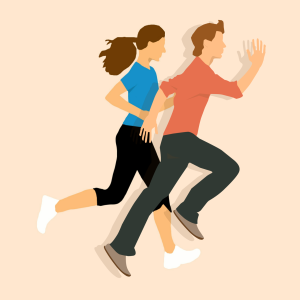New Research Suggests Exercise Can Lower Risk of Anxiety by More Than 60 Percent
 The findings of a study published with Frontiers in Psychiatry suggests that those who engage in regular exercise may lower their risk of developing anxiety by almost 60%. Using data on almost 400,000 people spanning more than two decades, the authors from Lund University in Sweden were also able to identify a noticeable difference in exercise performance level and the risk of developing anxiety between males and females.
The findings of a study published with Frontiers in Psychiatry suggests that those who engage in regular exercise may lower their risk of developing anxiety by almost 60%. Using data on almost 400,000 people spanning more than two decades, the authors from Lund University in Sweden were also able to identify a noticeable difference in exercise performance level and the risk of developing anxiety between males and females.
A quick online search for ways to improve our mental health will often come up with a myriad of different results. However, one of the most common suggestions put forward as a step to achieving wellness – and preventing future issues – is doing some physical exercise, whether it be a walk or playing a team sport.
Anxiety disorders – which typically develop early in a person’s life – are estimated to affect approximately 10% of the world’s population and have been found to be twice as common in women compared to men.
And while exercise is put forward as a promising strategy for the treatment of anxiety, little is known about the impact of exercise dose, intensity or physical fitness level on the risk of developing anxiety disorders.
To help answer this question, researchers in Sweden recently published a study in Frontiers in Psychiatry to show that those who took part in the world’s largest long-distance cross-country ski race (Vasaloppet) between 1989 and 2010 had a “significantly lower risk” of developing anxiety compared to non-skiers during the same period.
The study is based on data from almost 400,000 people in one of the largest ever population-wide epidemiology studies across both sexes.
“We found that the group with a more physically active lifestyle had an almost 60% lower risk of developing anxiety disorders over a follow-up period of up to 21 years,” said first author of the paper, Martine Svensson, and her colleague and principal investigator, Tomas Deierborg, of the Department of Experimental Medical Science at Lund University, Sweden.
“This association between a physically active lifestyle and a lower risk of anxiety was seen in both men and women.”
But does this mean that skiing in particular can play an important role in keeping anxiety at bay, as opposed to any other form of exercise? Not so, Svensson and Deierborg said, given that previous studies have also shown the benefits of keeping fit on our mental health.
“We think this cohort of cross-country skiers is a good proxy for an active lifestyle, but there could also be a component of being more outdoors among skiers,” they said.
“Studies focusing on specific sports may find slightly different results and magnitudes of the associations, but this is most likely due to other important factors that affect mental health and which you cannot easily control in research analysis.”
Excerpted from “New Research Shows Regular Exercise May Lower Risk of Developing Anxiety by Almost 60%” in SciTechDaily. Read the full article online.
Source: SciTechDaily | New Research Shows Regular Exercise May Lower Risk of Developing Anxiety by Almost 60%, https://scitechdaily.com/new-research-shows-regular-exercise-may-lower-risk-of-developing-anxiety-by-almost-60 | Copyright © 1998 – 2021 SciTechDaily
Do you need someone to talk to? To schedule an evaluation or to get advice about your child’s challenges, call or email a CHC Care Coordinator at 650.688.3625 or careteam@chconline.org CHC teletherapy services are available now.





